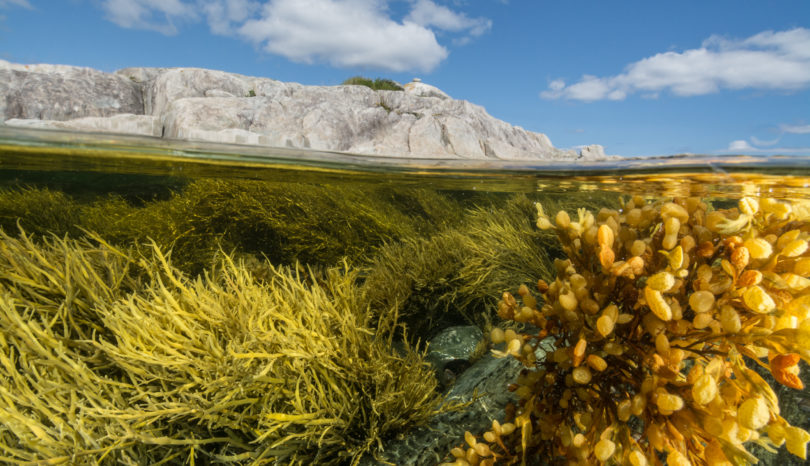The ocean, which makes up more than 70 percent of the planet’s surface, is where life on Earth first emerged. It continues to allow life to flourish, both in the waters and on land: marine phytoplankton have produced about half of the world’s oxygen, meaning every second breath you take came from the ocean.
An Interconnected System
The ocean is a “carbon sink” that takes in more carbon than it releases, and it plays a key role in regulating the global climate.
At the surface, the ocean absorbs and releases heat as well as carbon dioxide; the phytoplankton living near the top of the water column absorb as much carbon dioxide through photosynthesis as the world’s forests and plants do. Meanwhile, slow-moving currents drive dissolved carbon into the ocean’s cold depths, where it can remain for centuries. Carbon is also buried in the sediments of the seafloor. The global movement of heat, oxygen, carbon, and nutrients creates an interplay between healthy marine ecosystems and a healthy climate that supports life everywhere.
Pushing Our Life-Support System to Its Limits
Over the last 200 years, humans have radically altered the climate by burning fossil fuels and increasing the amount of greenhouse gases in the atmosphere, which has caused the planet to warm. The effects of increased heat and carbon emissions are pushing the ocean to its limits.
The ocean has protected us from the worst consequences of climate change, but at a cost to itself: the ocean absorbs about 31 percent of our carbon emissions each year, and it has taken in about 90 percent of the heat caused by global warming over the last 50 years. Increased levels of carbon dioxide in the water are causing the oceans to become more acidic. This makes it harder for some species to form their shells, from lobsters and crabs to the small “sea butterflies” that form an important link in Arctic marine food webs. Rising ocean temperatures are causing a variety of problems, including loss of sea ice, more frequent, intense storms, and marine heat waves that can kill off millions of animals.
Protecting and Adapting
Given the connections between the ocean and the climate, many of our campaigns cut across multiple bodies of work, including climate action, ocean protection and fisheries management.
As part of our holistic strategy to protect the ocean, we help develop ocean-based climate solutions that benefit the health of both, such as reducing emissions from marine activities. The shipping industry, for example, is responsible for around 3 percent of global emissions—comparable to the emissions of Japan or Germany—and that number is projected to rise. And because the majority of shipping takes place in international waters, countries have been slow to take action. Oceans North is bringing together stakeholders and policymakers who are interested in advancing zero-emissions fuels and technologies, reducing emissions from ports, and developing green shipping corridors. As part of this work, we are laying the groundwork for the creation of Canada’s first generation of zero-emission fishing vessels, among other initiatives.
In an era of climate change, it’s also vital to have industrial and fisheries management policies that are adaptive and forward thinking. That’s why Oceans North has worked on developing a framework for Arctic shipping in anticipation of increased activity in the region as the ice melts. For fisheries, research has shown that climate change is having and will continue to have effects on distribution, yield, and productivity throughout Atlantic Canada and the Eastern Arctic. However, climate change is not currently considered as part of fisheries management plans anywhere in Canada. Oceans North continues to advocate for more research into the impacts of climate on fisheries and the integration of this data into management.
Indigenous-led monitoring and management is one of the best tools to track and respond to changes in northern waters. Oceans North supports projects driven by local communities that answer the questions that matter to them. In Imaryuk (Husky Lakes), for example, a guardian program has been monitoring changes to the marine environment that could affect the region’s fisheries. Elsewhere, researchers have been collaborating with the community of Pond Inlet to understand how increased shipping is affecting marine mammals. Both Indigenous knowledge and western science will be needed to address the most pressing challenges facing our ocean.

